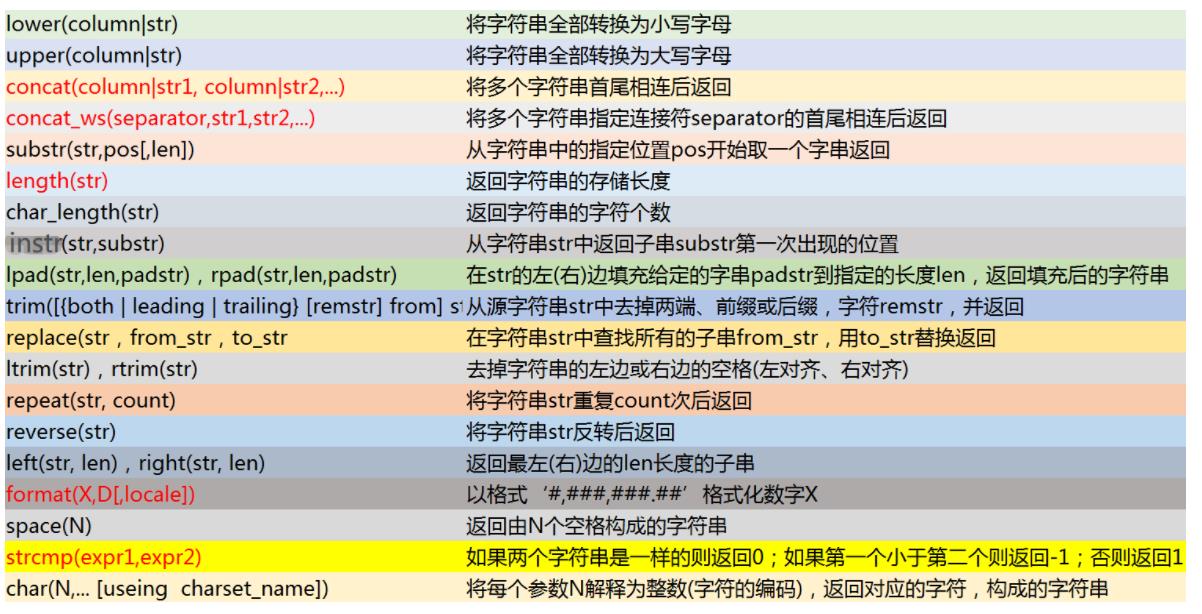MySQL笔记SQL经典实例(下)
Posted 可持续化发展
tags:
篇首语:本文由小常识网(cha138.com)小编为大家整理,主要介绍了MySQL笔记SQL经典实例(下)相关的知识,希望对你有一定的参考价值。
SQL示例中用到的表的结构和数据在文章
目录
字符串处理
了解SQL在字符串处理方面能做什么和不能做什么。
1、按照子字符串排序
select ename
from emp
order by substr(ename, length(ename)-1, 2);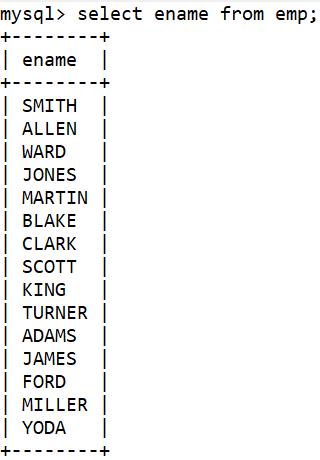
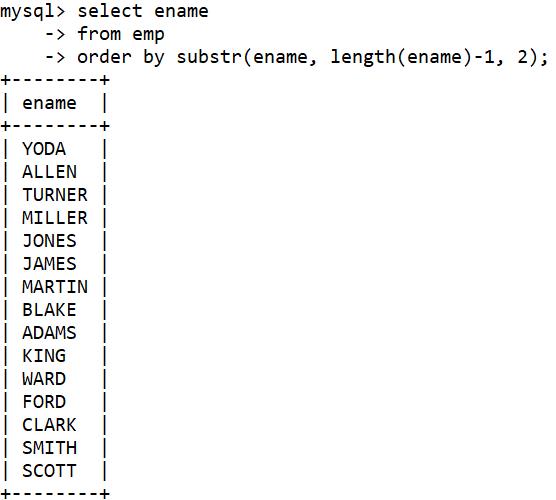

2、创建分隔列表
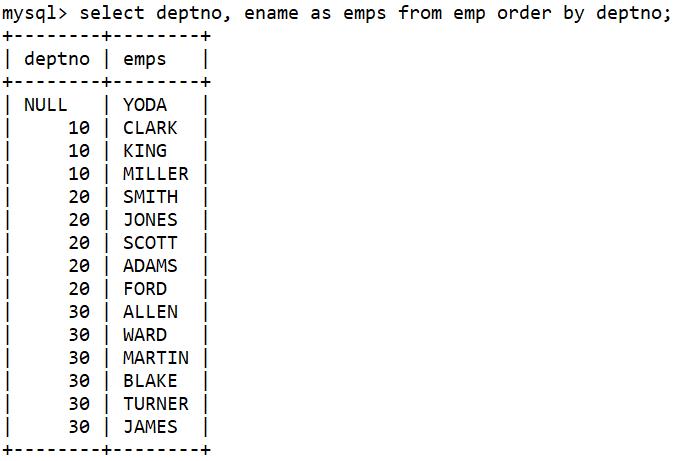
想把行数据变成以某种符号分隔的列表,例如以逗号分隔。
select deptno,
group_concat(ename order by empno separator ',') as emps
from emp
group by deptno;
3、分隔数据转换为多值in列表
例如,有一个字符串 "7654,7698,7782,7788" 。我想在where子句的in 后面用这个字符串。

数值处理
计算平均值
select avg(sal) as avg_sal from emp;
找最大、最小值
select min(sal) as min_sal, max(sal) as max_sal from emp;
求和
select sum(sal) from emp;
计算行数
select count(*) from emp;
计算非null值的个数
select count(comm) from emp;
日期运算
1、年月日加减法
select hiredate - interval 5 day as hd_minus_5D,
hiredate + interval 5 day as hd_plus_5D,
hiredate - interval 5 month as hd_minus_5M,
hiredate + interval 5 month as hd_plus_5M,
hiredate - interval 5 year as hd_minus_5Y,
hiredate + interval 5 year as hd_plus_5Y
from emp
where deptno = 10;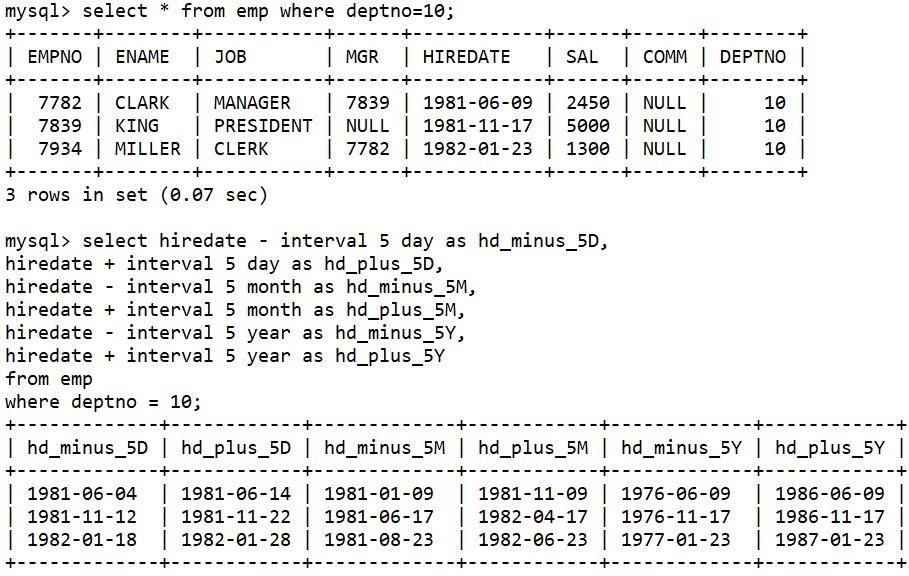
2、计算两个日期之间的天数
例如,想知道员工ALLEN和WARD的HIREDATE相差多少天。
select datediff( allen_hd, ward_hd)
from (
select hiredate as ward_hd
from emp
where ename = 'WARD'
) x, (
select hiredate as allen_hd
from emp
where ename = 'ALLEN'
) y;

3、计算两个日期之间相差的月份和年份
想找出两个日期之间相差多少个月或多少年。例如,希望知道第一个和最后一个员工的入职开始日期之间相差多少个月,同时想把这个差值换算成年。
select mnth, mnth/12
from (
select (year(max_hd) - year(min_hd))*12 + (month(max_hd) - month(min_hd)) as mnth
from (
select min(hiredate) as min_hd, max(hiredate) as max_hd
from emp
) x
) y;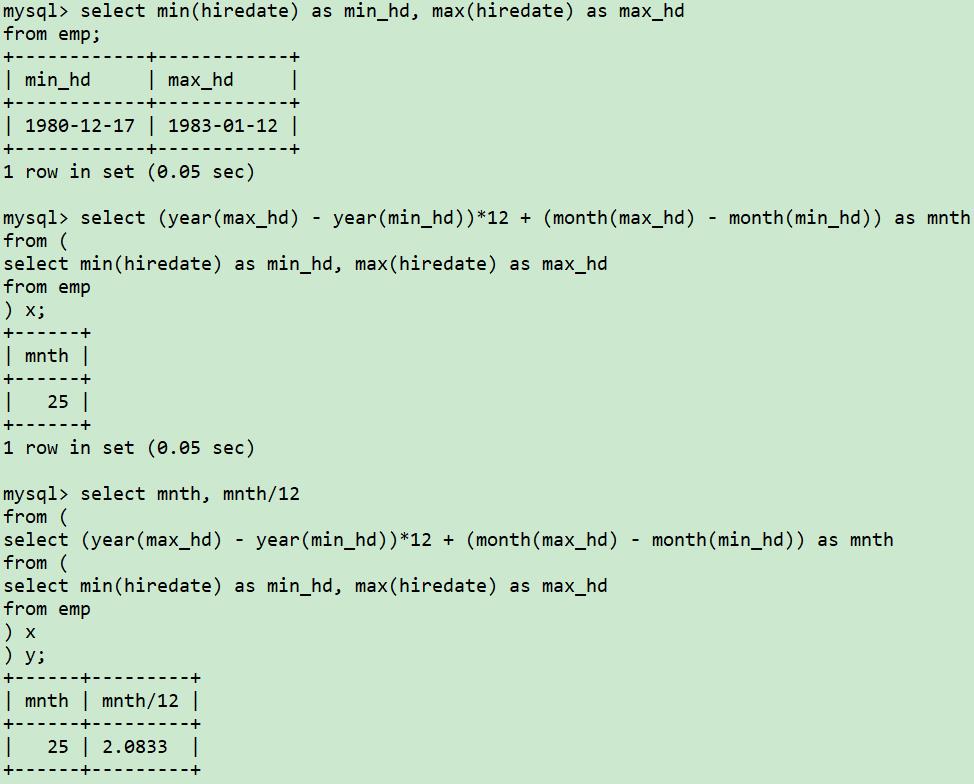
4、计算两个日期之间相差的秒数、分钟数、小时数
例如计算ALLEN和WARD的hiredate之间相差的时间,秒、分、小时。
先计算相差的天数,再进行时间单位换算。
select datediff(allen_hd, ward_hd)*24 hr,
datediff(allen_hd, ward_hd)*24*60 min,
datediff(allen_hd, ward_hd)*24*60*60 sec
from (
select max(case when ename = 'WARD' then hiredate end) as ward_hd,
max(case when ename = 'ALLEN' then hiredate end) as allen_hd
from emp
) x;

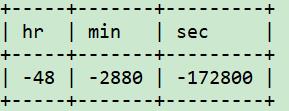
5、计算当前记录和下一条记录之间的日期差
计算两个日期之间相差多少天。例如,对于deptno等于10的部门的每一个员工,希望计算出他们入职日期之间相差多少天。
技巧:在早于当前入职时间的所有记录里找出hiredate的最小值,然后计算两个日期之间相差的天数
select x.*, datediff(x.hiredate, x.next_hd) diff
from (
select e.deptno, e.ename, e.hiredate,
(select min(d.hiredate) from emp d
where d.hiredate > e.hiredate) next_hd
from emp e
where e.deptno = 10
) x;
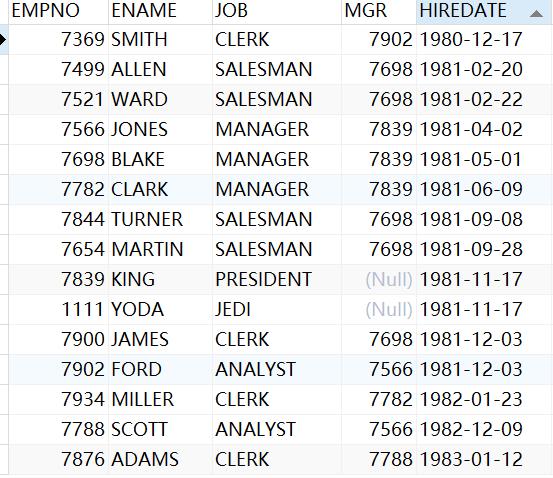
6、计算这个月的第一天和最后一天的日期
select date_add(current_date, interval -day(current_date)+1 day) firstday,
last_day(current_date) lastday;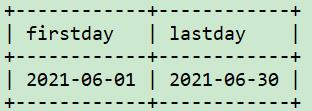

7、列出一年中每个季度的开始日期和结束日期
select quarter(adddate(dy, -1)) QTR,
date_add(dy, interval -3 month) Q_start,
adddate(dy, -1) Q_end
from (
select date_add(dy, interval (3*id) month) dy
from (
select id, adddate(current_date, -dayofyear(current_date)+1) dy
from t100
where id <= 4
) x
) y;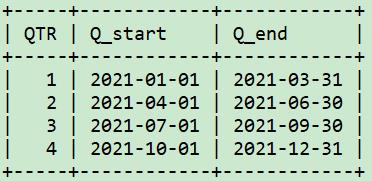

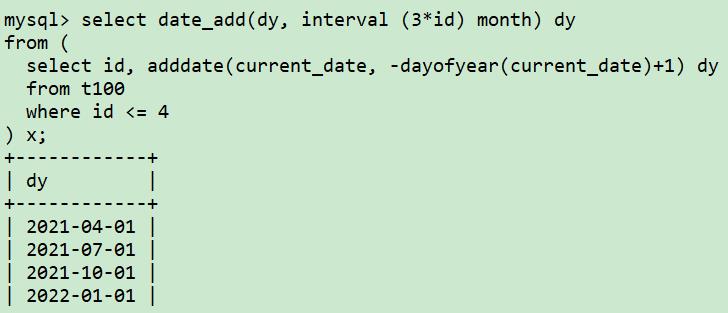
dayofyear DATE_ADD和ADDDATE函数:向日期添加指定时间间隔 QUARTER() 函数
8、依据特定时间单位检索数据
例如想找出入职月份为2月或者12月,并且入职当天是星期二的所有员工。
select ename from emp
where monthname(hiredate) in ('February', 'December')
or dayname(hiredate) = 'Tuesday';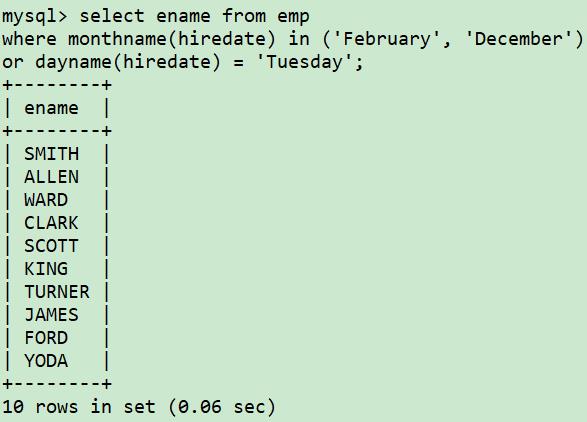
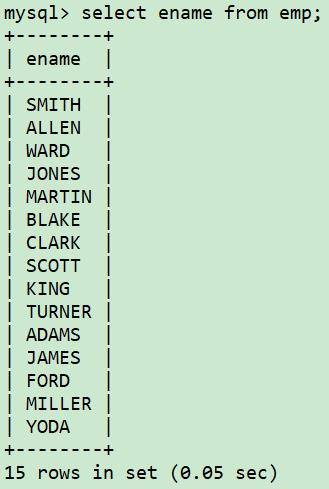
区间查询
1、定位连续的值空间
select * from V;
使用自连接找出包含连续值的行
select v1.proj_id, v1.proj_start, v1.proj_end
from V v1, V v2
where v1.proj_end = v2.proj_start;高级查询
1、结果集分页
select sal from emp
order by sal limit 5 offset 0;
select sal from emp
order by sal limit 5 offset 5;
2、跳过 n 行记录
结果集排序后,隔行查询记录。使用标量子查询模拟实现员工名字排序。
select *
from (
select a.ename,
(select count(*) from emp b where b.ename <= a.ename) as rn
from emp a
) x
where mod(x.rn, 2) = 1 order by rn;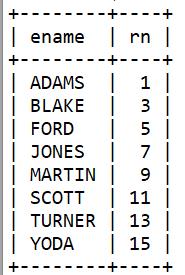
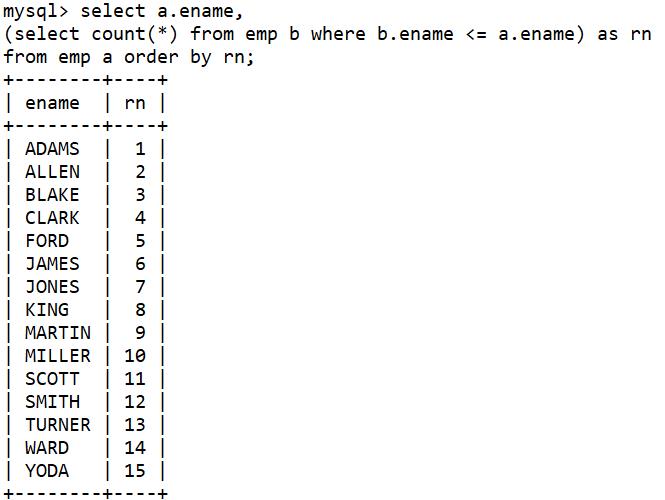
3、在外连接查询中使用 or 逻辑
想返回部门编号为10 和20 的全体员工的名字和部门信息,以及部门编号为30和40的部门信息(但不包含员工信息)。
select e.ename, d.deptno, d.dname, d.loc
from dept d left join emp e
on (d.deptno = e.deptno and (e.deptno = 10 or e.deptno = 20))
order by 2;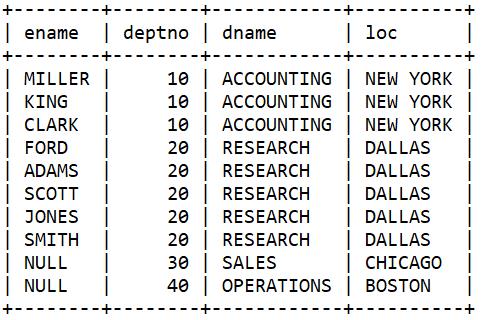
错误示例1
select e.ename, d.deptno, d.dname, d.loc
from dept d, emp e
where d.deptno = e.deptno
and (e.deptno = 10 or e.deptno = 20)
order by 2;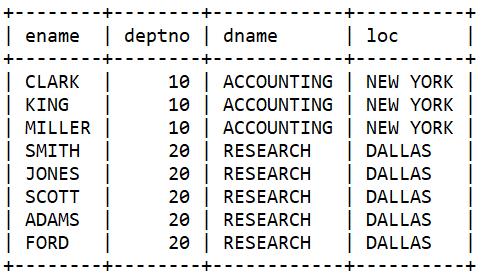 这个是内连接。
这个是内连接。
错误示例2
select e.ename, d.deptno, d.dname, d.loc
from dept d left join emp e
on (d.deptno = e.deptno)
where e.deptno = 10 or e.deptno = 20 order by 2;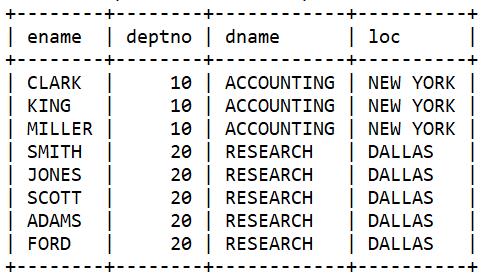 左外连接。
左外连接。
4、提取最靠前的N行记录
先排序,再提取。
返回前5种不同的工资值的员工。
select * from (
select
(select count(distinct b.sal) from emp b where a.sal <= b.sal) as rnk,
a.sal, a.ename
from emp a ) x
where rnk <= 5
order by rnk;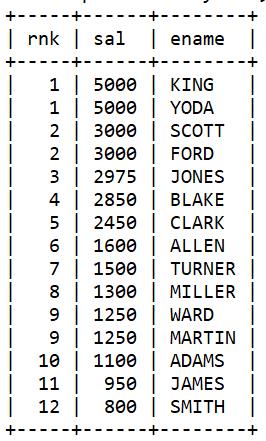
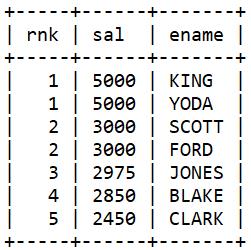
返回工资是前5名的员工
select x.ename, x.sal
from
(select * from emp order by sal) x
order by x.sal desc limit 5;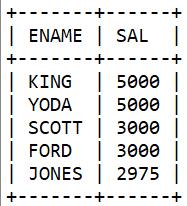
5、找出最大和最小的记录
select ename, sal
from emp
where sal in ((select min(sal) from emp),(select max(sal) from emp));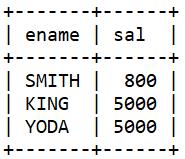
6、查询未来的行
想找出这样的员工:当前员工的工资低于紧随其后入职的同事,找出工资低的那些人。
- 入职比他晚、且工资更高的员工当中最早入职的那个人的入职日期(next_sal_grtr)
- 入职比他晚的员工中最早入职的那个人的入职日期(next_hire)
select ename, sal, hiredate
from (
select a.ename, a.sal, a.hiredate,
(select min(hiredate) from emp b where b.hiredate > a.hiredate and b.sal > a.sal) as next_sal_grtr,
(select min(hiredate) from emp b where b.hiredate > a.hiredate) as next_hire
from emp a
) x
where next_sal_grtr = next_hire;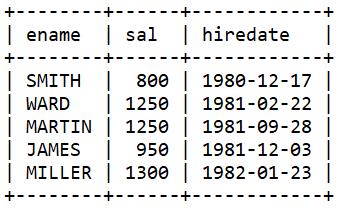
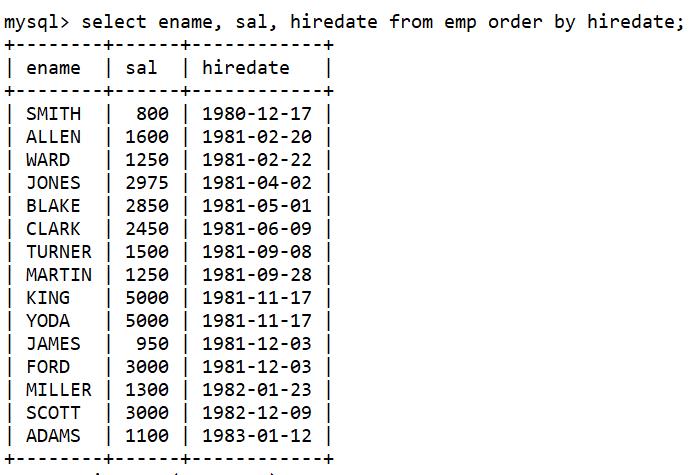
7、对结果排序,允许Tie(平手)
select (
select count(distinct b.sal) from emp b where b.sal <= a.sal
) as rnk, a.sal
from emp a order by a.sal;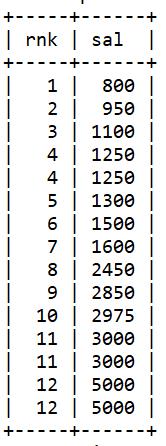
8、删除重复项
想找出emp表中不同的职位种类,但又不希望看到重复项。
select distinct job from emp;
select job from emp group by emp;
以上是关于MySQL笔记SQL经典实例(下)的主要内容,如果未能解决你的问题,请参考以下文章
